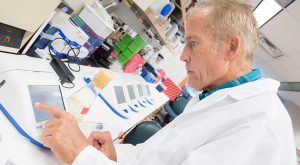A portable, hand-held instrument that uses genetics to detect the red tide-causing organism Karenia brevis in the field was featured at the second NOAA Emerging Technologies for Observations Workshop. The device, dubbed a “tricorder” after the fictional Star Trek hand-held life detector, is the first of its kind and is able to provide direct results to end users such as government agencies and businesses.

This technology speeds up the decision-making process in closing beaches and shellfish harvesting beds, as well as helping determine the cause of fish kills. The tricorder uses a biotechnology technique called nucleic acid sequence-based amplification to target the messenger RNA in the carbon fixation gene specific to K. brevis.
Red tides in Florida coastal waters (caused principally by K. brevis) can threaten human health and cost millions in tourism, agriculture, seafood, and leisure industries. Currently the State of Florida detects and enumerates K. brevis through the relatively slow, labor intensive and expert process of light microscopy to differentiate this toxic alga from closely related non-toxic and less toxic species.
As the technology develops, data from the hand-held tricorders gets uploaded to the Gulf of Mexico Coastal Ocean Observing System (GCOOS) for automated processing and calculation of K. brevis cell abundance and data visualization. Users include the Florida Department of Environmental Protection, Florida Department of Agriculture and Consumer Services, and the Florida Fish and Wildlife Conservation Commission.
The project is co-led by Dr. John Paul of the University of South Florida and Dr. Kate Hubbard of the Florida Fish and Wildlife Conservation Commission, and is supported by an NCCOS PCMHAB Program project.
The second NOAA Emerging Technologies for Observations Workshop was held August 22–23, 2017, at the NOAA Center for Weather and Climate Prediction, College Park, MD. The workshop highlights new environmental observing capabilities and applications that can improve NOAA services and enhance organizational efficiency.
For more information, contact John.Wickham@noaa.gov.
